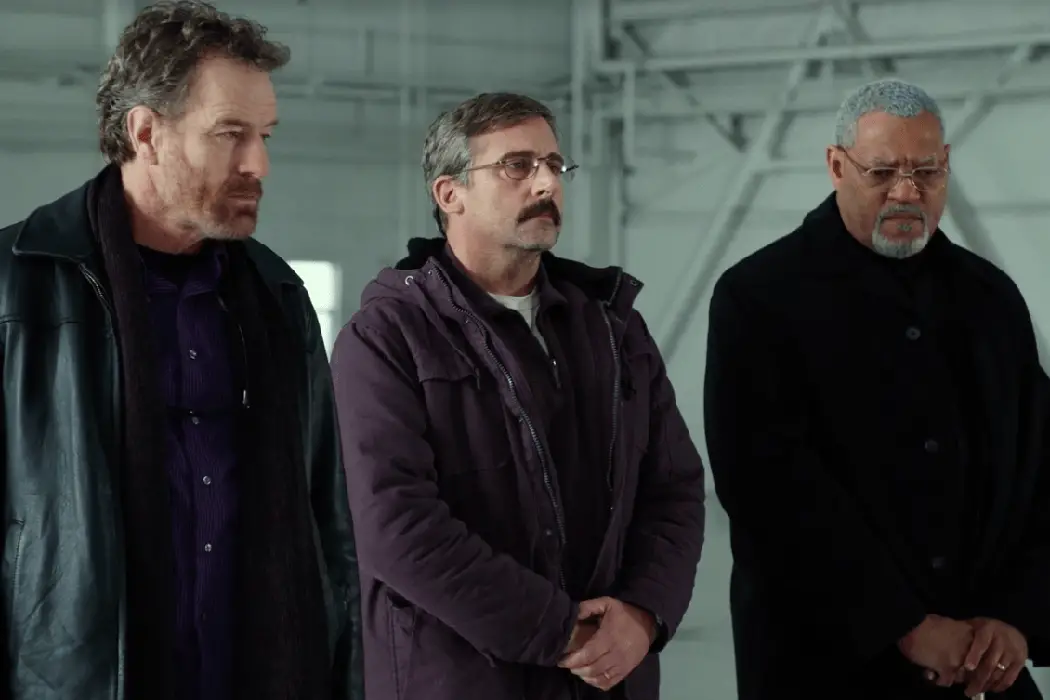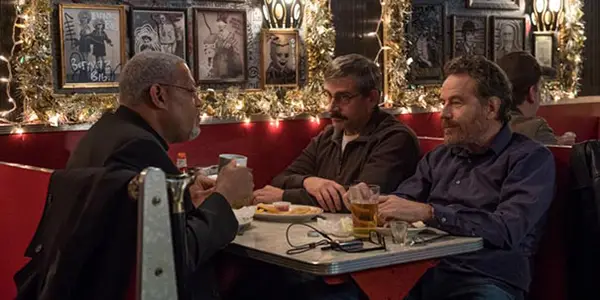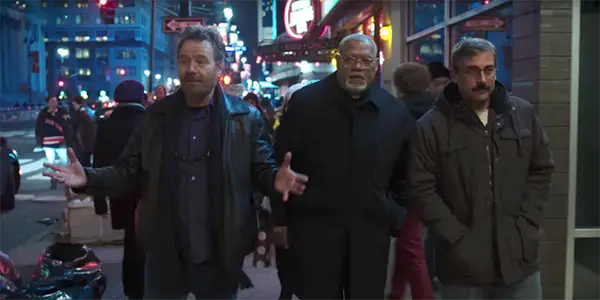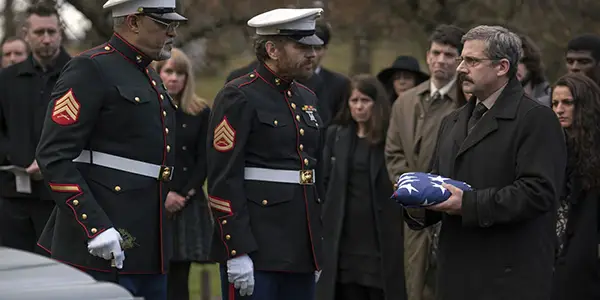LAST FLAG FLYING: Momentarily Enjoyable, But Ultimately Forgettable

David is a film aficionado from Colchester, Connecticut. He enjoys…
Richard Linklater has become renowned through the years for his unique and diverse filmography, with films ranging from the time-stretched sagas of the Before series and Boyhood, to more existential, experimental films such as Waking Life and A Scanner Darkly, to more mainstream fare like School of Rock and the Bad News Bears remake. Some of these are arguably more successful than others, but it’s hard to discount the impact as a whole that he has had on independent filmmaking.
With Last Flag Flying, a sequel to The Last Detail, Linklater has tackled a difficult task, which is, first and foremost, as a comparative sequel to the first film (though it was stated by Darryl Ponicsan, the writer of both novels, that the film is more of a sequel to the first book as opposed to the Hal Ashby film). Set thirty years later, the film also had to be current, picking up farther down the line for the characters in addition to tying into modern times.
Though Last Flag Flying is shaky, suffering from an unfocused script and an extended run-time, it is, overall, a lighthearted, heartfelt work, further demonstrating the potential for humanistic storytelling that is the true essence of Linklater‘s talents as a filmmaker.
“I’m just going to bury my son.”
Last Flag Flying is set in the year 2003. Larry “Doc” Shepherd (Steve Carell) enters the bar of Sal Nealon (Bryan Cranston). Though unaware at first, Sal soon recognizes Doc from an encounter they had thirty years prior, when both Sal and a man named Mueller, both Marines at a base in Norfolk, Virginia, were assigned to escort Doc to a Naval Prison near Kittery, Maine for a crime that Doc had committed. Along the way, they have multiple adventures in cities that they pass through, often as a result of Sal’s spontaneity and Mueller’s reluctant but still mostly willing desire to play along.
After some catching up in the present, Sal and Doc then travel to a church, where, lo and behold, Mueller himself (Laurence Fishburne) is giving a sermon at the altar. Once the three are reunited, Doc reveals the real reason why he has gathered them together after such a long time: three days ago, his son, Larry, Jr., who followed in his father’s footsteps by joining the Marines, was unfortunately killed while fighting in Baghdad. Downtrodden, Doc desires the comfort of old friends to come with him to attend his son’s funeral. Though Mueller is at first hesitant, due to the shenanigans he had gotten into as a result of his past encounters with the group, eventually the three head off together to transport and then bury Doc’s fallen son in his hometown of Portsmouth, New Hampshire.

What results from this unlikely joining together is, story-wise at least, reminiscent of the events of the first film, in that it is based around a road trip, though this time for a very different, and far more depressing reason. Yet, though containing all the ingredients of a sappy tearjerker, Linklater‘s tone is much more nuanced and balanced throughout. From a tender bonding moment dealing with a subject as painful as the loss of a loved one will soon follow a more pleasant exchange bursting with a kind of joyful relief, usually also bridged by Graham Reynolds‘ somber piano theme.
Perhaps the best example of this wide range of tone comes when the three are traveling on a train, also accompanied by Larry, Jr.’s best friend in the Marines who was with him at the end, a man named Washington (delightfully played by the young J. Quinton Johnson, who also starred in Linklater‘s Everybody Wants Some!!)). In one scene, the three men discuss the unfairness of going to war for one’s country, discussing the current Iraq war in comparison to Vietnam, in that both simply were a result of America’s unrelenting desire to meddle in the affairs of other countries. The discussion seems to bring up the idea of the sheer pointlessness of Larry, Jr.’s death.
Yet, immediately following this scene, while in the backroom compartment of the train, the men nostalgically reflect on their past, led by the flamboyant storytelling talents of Sal, who discusses his own past sexual conquests and adventures. It’s an uproariously hilarious exchange, in which the laughter of the characters is contagious and hard to resist. It’s easy to forget, in that moment, that they are actually sitting within the same room as Larry Jr.’s dead body.
“I got God. Doc did his time. You got drunk.”
Last Flag Flying in some ways reminded me of another recent Amazon Studios offering, Manchester by the Sea, which also revolves around the loss of a loved one, while containing a healthy blend of laughter and more poignant moments. Both films target grief, showing the varying ways in which people deal with this very human emotion.
In Last Flag Flying, this can be seen in the contrasting personas of Mueller and Sal. Mueller, now a priest and with his partying days behind him, offers consoling words for Larry for his son; while Sal, more down-to-earth yet chaotic in nature, tries to get Larry to face the reality of what losing his son really means instead. Though their journey itself is based around the dour subject of death, Sal is also determined to enjoy it if he can.

Highlights along their journey (which also date the film in a clever way) include the three buying their first cellphone, discussing the rise of rap on the radio, and, like the train scene mentioned earlier, simply reflecting on days long past. It is within these moments, when really allowed to let loose, that Bryan Cranston steals the film. Cranston fully commits to the role, portraying the wise-cracking, sarcastic manchild persona with unfettered enthusiasm. Though originally played by Jack Nicholson in the first film, Cranston admirably makes the character his own, taking perhaps a leaf from Nicholson‘s eccentricities before drifting into his own interpretation. After a time, admittedly, his overemphasized gestures and elaborate antics do get a bit exhausting, yet Cranston also helps to propel the film through some of its more lethargic moments. Fishburne also plays well off of this, not-so-silently judging Sal’s unhinged lifestyle, yet also occasionally letting out a profanity as well when he uncontrollably reverts back to his old self.
In contrast to both Sal and Mueller, Steve Carell‘s Larry is a silent shroud, often seeming to be an emotionless shell even when amongst his old friends. It’s entirely understandable, though, given what had happened to him and his family, and Carell is more than comfortable playing the straight man as opposed to the more outlandish personas that he has become known for. You can tell, through even the slightest facial tic by Carell, that brimming beneath the surface of Larry’s vacuous expression is an almost indescribable pain.
“Men make the wars and wars make the men.”
Last Flag Flying delves into the little-explored topic of the impact of war on people later in life, showing the distinction between Sal, who never grew up, and Mueller, who found religion. Yet, by its conclusion, the film seems to stop just shy of providing any conclusive answers on its subject. Larry’s son died in a purposeless war, yet he is honored as a hero by the film’s conclusion; Sal, who arguably doesn’t deserve a carefree lifestyle, carries on; and Mueller, who has found religion, seems to have done so as a way of masking his inner turmoil as a result of the war. And, after all they have been through, it’s hard to make out a definitive character arc for anyone other than perhaps Larry himself.

This uncertainty can be best summed up in the film’s penultimate scene. Mueller and Sal, now dressed in their Marine suits, honor Larry’s son with a military funeral, going through the motions of folding the American flag and symbolically presenting it to Larry. It’s a precisely-directed and militarily accurate scene, yet it also attempts to overshadow the remainder of the movie. What does Larry’s, Jr.’s death really signify? Where will the men go on from here? Has Sal learned anything as a result of this road trip, or will he go back to living the same nonsense lifestyle? Will Mueller learn to lighten up a bit after their experiences? These questions are left unanswered, and by hanging listlessly, it makes the film far less conclusive than it ought to be, especially given the weight of its material and the amount of time that it took to get here.
Last Flag Flying: Conclusion
Understandably, it’s an immense task to make a film that both honors soldiers while simultaneously deriding the idea of war itself. Richard Linklater‘s film thankfully does have moments of greatness, and is a pleasant watch as a whole, yet it doesn’t quite delve as deep as it could at these underlying concepts, ultimately feeling somewhat forgettable as a result. It’s the type of film that, while enjoyable, likely won’t stick around in your mind for very long. Yet, through Linklater‘s careful, measured direction, and the talent behind the film’s cast, there is just enough here to recommend.
What did you think of Last Flag Flying? Do you think it is a good comparative film to The Last Detail?
Last Flag Flying is coming to American cinemas on November 3rd.
Does content like this matter to you?
Become a Member and support film journalism. Unlock access to all of Film Inquiry`s great articles. Join a community of like-minded readers who are passionate about cinema - get access to our private members Network, give back to independent filmmakers, and more.
David is a film aficionado from Colchester, Connecticut. He enjoys writing, reading, analyzing, and of course, watching movies. His favorite genres are westerns, crime dramas, horror, and sci-fis. He also enjoys binge-watching TV shows on Netflix.













